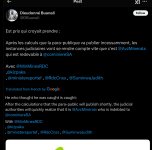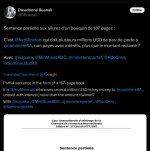It is Unreal but now the Floodgates have Finally opened, Media outlets are Soaking it up
Putting the Spotlight firmly on Felix and the Democratic Republic of Corruption
 View attachment 79550
View attachment 79550
Congo president meets US lawmaker amid talk of minerals deal
Democratic Republic of Congo’s President Felix Tshisekedi has met U.S. lawmaker Ronny Jackson to discuss fighting in the east of the country and opportunities for U.S. investment, Congo’s presidency said.
The meeting took place one week after Washington said it was open to exploring critical minerals partnerships with Congo.
A Congolese lawmaker in February contacted U.S. officials to pitch a minerals-for-security deal.
A presidential statement described Jackson as a “special envoy” for U.S. President Donald Trump.
Tshisekedi faces an insurgency by Rwanda-backed M23 rebels in east Congo and his government plans to send a delegation to peace talks in Angola on Tuesday.
Congo has vast reserves of cobalt, lithium and uranium among other minerals.
The government has not publicly detailed a proposal for a deal with the U.S., saying only that it was seeking diversified partnerships.
There was no direct mention of minerals in Sunday’s statement.
“We want to work so that American companies can come and invest and work in the DRC.
And to do that, we have to make sure that there is a peaceful environment,” Jackson was quoted as saying in the statement.
The long-running conflict in east Congo is rooted in the spillover into Congo of Rwanda’s 1994 genocide and the struggle for control of Congo’s vast mineral resources.
It escalated significantly this year and M23 now controls east Congo’s two biggest cities.
Rwanda is accused of backing the Tutsi-led M23, which it denies.
Byron Cabrol, senior Africa analyst at Dragonfly, said last week it would be a struggle to entice U.S. mining companies to invest in Congo due to poor infrastructure, insecurity, corruption and the dominance of Chinese firms.
View attachment 79551











